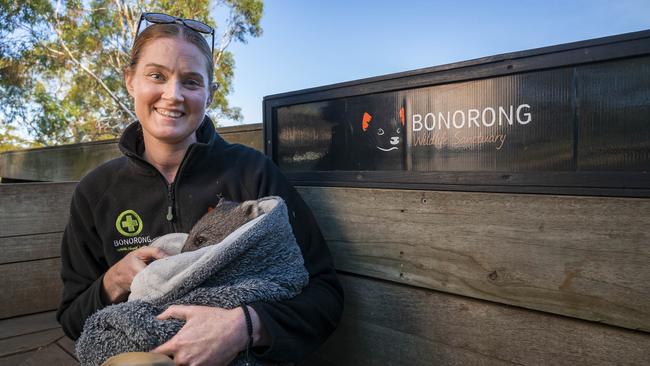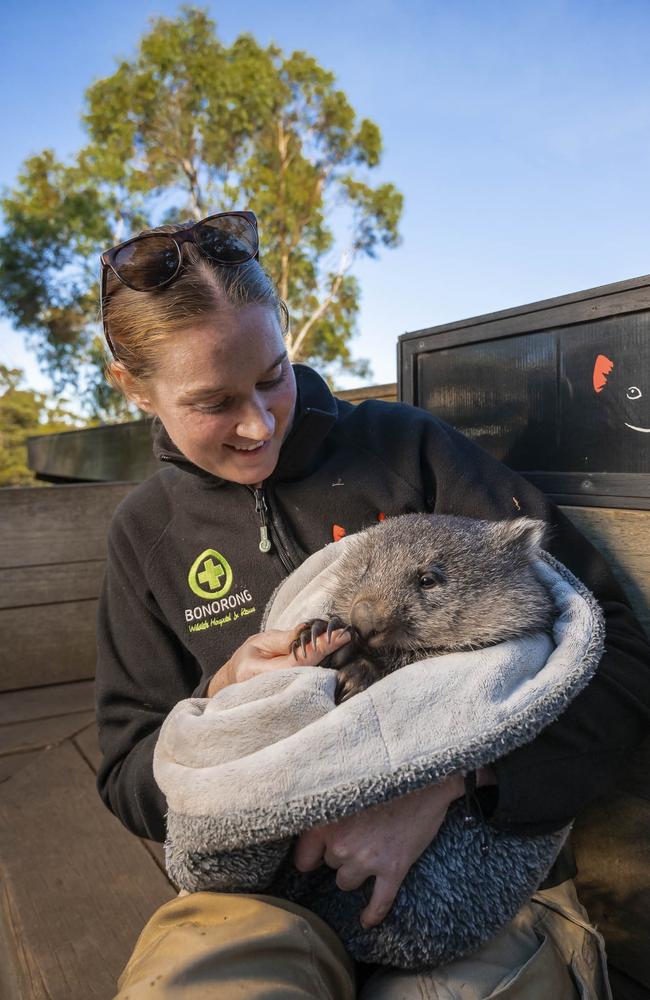Bonorong Wildlife Sanctuary on why you’re seeing a huge spike in roadkill
Bessie the baby wombat is one of thousands of animals left orphaned after their mums were killed on Tasmanian roads. Wildlife rescuers say why there’s been a huge spike in roadkill.

Tasmania
Don't miss out on the headlines from Tasmania. Followed categories will be added to My News.
The state’s leading wildlife rescue service has reported a sudden spike in roadkill prompting appeals for motorists to slow down while driving at night.
Bonorong Wildlife Sanctuary Primary Care Manager Emily Garvey said carers had seen a huge increase in calls for assistance, with Bennett’s wallabies and Tasmanian pademelons being the most commonly found.
“We’ve had just under 3500 phone calls in the last year for animals that were found by the road. In 2023, that was only at about 1400. So we’ve seen a huge increase unfortunately,”
“There’s a local road not too far from the Sanctuary that’s just a seven minute stretch, in one night 44 fresh carcasses were found.”
Mr Garvey said the change back from daylight savings and shorter days meant more traffic on the road in the dark.
“Now that we’re getting into those cooler months, it’s getting darker much quicker and the mornings are staying darker for a lot longer,” Ms Garvey said.
“If you do have to drive at dusk or dawn just slow down. Even 5km/h less is a huge difference, it gives you time to react and stop,
“If you do see something in the road, if it’s alive, you can always call our rescue service or if it’s deceased and it’s a marsupial check its pouch.”

One such rescued animal is Bessie the baby wombat who weighed just 1.5 kgs when she was found inside her mum’s pouch after she was killed by a car in January.
The tiny wombat was taken north of Hobart, where she has been thriving now weighing 6 kgs.
But as the colder months bring shorter days, the Sanctuary said they had been seeing a spike in roadkill, leaving more animals orphaned like Bessie.
While Bessie will likely be able to be released back into the wild, most other species will have to stay at the Sanctuary permanently.
“All our wombats that we have at the moment are orphans because mum was hit by a car, so they’ve been able to have a second chance at life,” Ms Garvey said.
“Wombats are the only animal that we do get to have on display that we can successfully release back out into the wild.
“For the other animals that come through to the rescue service, depending on the species, they will need to stay here as permanent residents.
“Our Tawny frogmouths, they are both car strike victims as well and have ended up with injured eyes and can’t be released.”
Tasmania’s roadkill statistics are some of the worst in the country, with 500,000 animals killed every year on average.
With Tasmania now known as the roadkill capital of the world, Bonorong is urging drivers to slow down and call 0447 264 625 for advice if they come across an injured animal.
Originally published as Bonorong Wildlife Sanctuary on why you’re seeing a huge spike in roadkill


